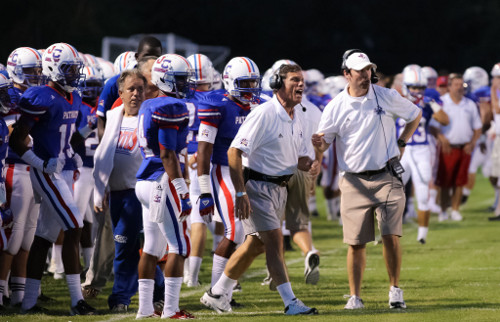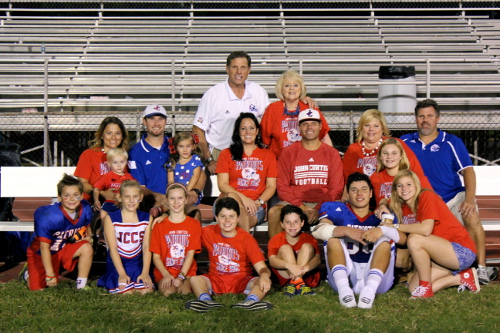From deep in the heart of Bayou Country, coach J.T. Curtis took the fledgling River Ridge (Louisiana) John Curtis Christian School football program from some very inauspicious beginnings and quickly turned it into one of the nation’s very best.
In the process, he has also established himself to be among the nation’s elite high school football coaches.

Shown above is J.T. Curtis coaching a game
According to the NFHS’ online National High School Sports Record Book, Curtis trails only John McKissick on the all-time 11-player football coaching victories list.
Entering the 2014 season, McKissick had accumulated a 613-151-13 win-loss record since his career started at Summerville (South Carolina) High School in 1952.
Despite starting 17 years after McKissick, Curtis has compiled a win-loss record of 530-56-6, all at John Curtis Christian School.
During his first season (1969), the then-22-year-old Curtis led the Patriots to a 0-10 record (0-11 if one recognizes the jamboree game). In that inaugural campaign, he greeted just six players on the first day of practice.
However, Curtis turned things around in hurry as the program attracted 40 players the following season, went 8-2 and made the playoffs. Just five years after that, the Patriots won their first Louisiana High School Athletic Association (LHSAA) football state championship – the first of 26 state titles to which Curtis has led the program.
“On that first day of practice in 1969, we had just six players and 40 notebooks,” Curtis recalled. “At the time, my dad was school principal. When I asked him ‘What should I do?’ he said ‘I think I’d get on the phone and start calling people.’ We ended up with 22 players. I’ll never forget that first year and I never take any year for granted.”
According to Curtis, there are certain factors that have contributed to the program’s success over the years.
“I think there are a few things,” he began. “First, you have to have a great administration that wants your team to be successful, and understands the value of that program.
“Second, you want to surround yourself with great coaches. My brother Leon Curtis has been with me since 1971. In addition, our offensive line coach Mike Robertson has also been with me since the beginning.
”The third thing is the off-season program and how you develop players in terms of athleticism. In the off-season, we’re developing our skills and our physical strength. If we can make that person a better athlete who can jump higher, run faster, etc., they’ll be a better player. And through that, they gain a lot of self-confidence. That’s a big difference-maker.”

Shown above is J.T. Curtis with three LHSAA football state championship trophies
With 45 years having elapsed since Curtis assumed the reins and along with a myriad of societal changes that have occurred, he can compare and contrast the players on that inaugural 1969 team with this year’s team both in terms of on-field issues and in terms of simply being kids.
“Of course, these days we have Facebook, cell phones, Instagram and the Internet – none of which existed in 1969,” Curtis began. “Today, the problems are different, but the needs are the same. We had been through it all in the 1970s with war, drugs, racial tensions and everything else that happened - we’ve seen them all.
“But really – both back then and now – kids want the following three things. One, they want to know you love them. Two, they want to be disciplined. And three, they want structure in their lives.
“In a sense, you could compare a high school football team to a gang in Los Angeles. – they are both teams, they both have uniforms, they both have nicknames and they both have purpose. That’s what kids want - they want motivation. So, let’s do it positively. I think that is the intrinsic value of athletics ‑ that’s very important in the lives of young people.”
Under Curtis’ direction, the Patriots football program has won 26 state titles from 1975 to 2013 – which ranks seventh all-time nationally, according to the National High School Sports Record Book. In addition, he led teams to 12 undefeated seasons. As he looks back on his very successful coaching tenure, certain accomplishments stand out more than others.
“I would have to say that the accomplishment I’m most proud of was probably winning that first game in 1970,” Curtis said. “Then, winning our first championship in 1975 was a real special time. Every season is special, every team is different, and every group of kids needs to be motivated differently.”
Clearly recognizing that sports go far beyond mere X’s and O’s, winning games and winning states titles, Curtis embraces a positive philosophy of what is truly important in the high school coaching profession.
“Athletics should provide some strong intrinsic values for the kids,” Curtis said. “If all we have at the end of day is a score on the scoreboard, then I’m not sure it’s worth the time and money that goes into it.
“The memorable things are those moments when you see guys accomplish things they otherwise would not have, were they not in your program. For example, they would have never developed their skills.
“I’ve been fortunate to have had great players – but I want them to be better than what they were before they came to us. That’s where you come in as a coach – you help develop them. Whether you’re the greatest player or just one of the guys who wants to play, you want to see them go above and beyond. That’s fun for me personally.”
“I’ve had kids come back years later who told me ‘Coach, you helped me out’ and they thank me for that. That’s a collective effort of all the coaches working in the program. We discipline them because we love them. It’s about developing better young people who will go on to become meaningful contributors in their respective communities as adults. Spiritual development is the most important part - spiritual values have sometimes been taken away from us.”

Standing: J.T .and Lydia (parents); Sitting on bench: (left to right) Jeff Curtis (their youngest child) and wife Toni to his left, Johnny (their middle child) with his wife Dawn to his left; Joanna (their oldest child) who is married to the high school’s strength and conditioning coach, who graduated from the school and is sitting to her right. The five children on the left under Jeff and Toni are theirs; the three boys under Johnny and Dawn are theirs; and the two girls on the end are Joanna’s. John Thomas Curtis, IV is in his football uniform.
J.T. and his wife, Lydia, are the parents of three children. Sons Jeff and Johnny both played football at Tulane University, while daughter Joanna is married to J.T.’s secondary coach Tommy Fabacher.
With J.T.’s great success at the high school level, it’s not surprising to learn that he had opportunities to coach at the college level.
“I’ve had numerous opportunities for both head coaching and assistant coaching positions at D-I schools,” Curtis said. “I got my first offer early to coach in college, but I decided to not get into that rat race with my family – I felt a very strong calling here. We live good life with a good house – we do okay.”
At age 67, Curtis is still both highly energetic and highly successful. Nonetheless, the question of how long he plans to coach occasionally comes up.
“I don’t think I’ll go as long as McKissick,” Curtis began. “Here’s how I feel - as long as I’m able to have the enthusiasm, passion and drive, the health holds up, and I’m able to have a staff that’s supportive, then I’ll continue to coach. If I can no longer give my best effort to my players, I‘ll stop coaching. I enjoy watching the progress of the kids. As long as I’m able to have the passion and drive, I’ll continue to coach - if not, I’ll walk away.”
John Gillis
John Gillis is the associate director of development of the NFHS. If you have any comments or articles ideas, please forward them to Gillis at jgillis@nfhs.org
Most Recent Articles
- nfhs news NFHS Learning Center Unveils School Honor Roll Program
- NFHS Network Contact Information
- nfhs news Shout-out to Health-Care Workers and State High School Associations
- state news Stadiums Across Colorado Light Up to Show Support for Students
- gymnastics-girls article ‘They became a family’: How New Castle gymnastics qualified for state for first time since 2002



